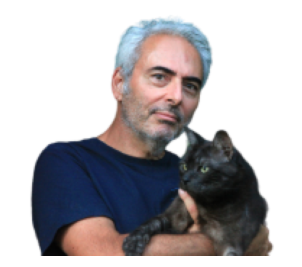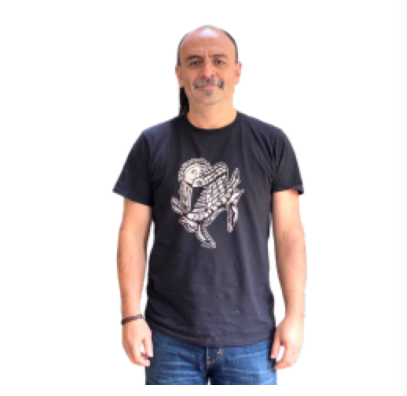The necessity to asses the risks of viral contagion, and to implement an effective policy of prevention of zoonoses and pandemics represent some of the biggest challenges of contemporary societies. The loss of natural habitats due to human activities, the increase in health crises and the link between these and other major threats such as the collapse of biodiversity and climate change are leading us to rethink our relationship with nature.
The concept of "One Health" has been forged in this very purpose and, with the support of its partner CIWF, ICBT wants to take stock of the situation during an international webinar by raising two main questions: what does the latest research tell us about the causes of natural habitat loss, its impact on epidemic risks and how to remedy it, not only by restoring degraded biotopes — which implies jointly protecting the species that live there — but also by preventing this habitat loss.
As the multiple interactions between the components of the living word are particularly complex and evolve very rapidly, anticipating epidemic risks requires in-depth scientific research, close and constant observation of natural environments and long experience in the field.
To address these crucial questions, we are fortunate to bring together an exceptional panel of international experts, made up of CEO of NGOs and eminent scientists who are also, for most of them, field conservationists.
The organisers of the webinar, like all their guests, believe that our approach to the main challenges of our time must be global and constantly take into consideration the necessary balance between the different species, including humans. Beyond the often alarming observations concerning the loss of biodiversity and the degradation of environment, we wish to adopt a positive perspective, envisaging concrete solutions, some of which have already been put into practice in the field by several of our guests, particularly in Asia and Africa.
This webinar aims to review in simple terms the state of academic research and field observation in order to reach a large audience, and to discuss ways of mitigating the risks of epidemics while preserving biodiversity and taking into account animal welfare and the needs of human communities.
The ICBT hopes that this meeting will be the start of regular workshops that it intends to set up on various biodiversity-related topics such as agriculture, climate change, the fight against the illegal wildlife trade or human-wildlife conflicts, with the ambition of influencing public policy.
Chair

Laurent Dingli
Founding President ICBT
Biodiversity MAG Editor
International Advisor CBCGDF
Guest Speakers

Zhou Jinfeng
Dr. Jinfeng Zhou is the incumbent Secretary General of China Biodiversity Conservation and Green Development Foundation (CBCGDF), a leading environmental NGO in China. He is also a full member of the Club of Rome and the World Commission Environmental Law (WCEL) of IUCN, a member of the World Commission on Protected Areas (WCPA) of IUCN, and a member of IUCN WCPA Task Force on Other Effective Area-Based Conservation Measures (OECMs), a Board member of the SUNx (Strong Universal Network), Co-Director of the Center of Ecological Civilization of the Institute of Socialism with Chinese Characteristics for a New Era at Peking University, Chief researcher of green development at the Internet Finance Research Institute of Zhejiang University, Vice Chairman of the World Green Design Organization (WGDO).
The One Health Approach to Reduce Habitat Loss and Disease
The One Health approach is a effective solution to reduce habitat loss & disease outbreaks. Jinfeng Zhou will share his idea about Habitat loss & disease outbreaks from Chinese practice.

Serge Morand
Serge Morand is a health ecologist studying the impacts of land use, climate change and agriculture intensification on the links between biodiversity and health. He belongs to the French CNRS and he is based in Thailand at the Faculty of Veterinary Technology (Kasetsart University), and invited Professor at the Faculty of Tropical Medicine (Mahidol University). Serge Morand is member of the One Health High Level Expert Panel (OHHLEP).
Agriculture, biodiversity and infectious diseases
The links observed between infectious disease outbreaks, agriculture, livestock, human demography, urbanization and biodiversity should help rethink the global food system and production in ways that minimize the risk of infectious diseases while preserving biodiversity and contributing to the Sustainable Goals. A transformation of the global food system should be environmentally sustainable, prioritizes health and recognizes the contribution of small farms.
This transformation involves reintegrating agriculture, livestock and pastoralism into territorial development, developing agroecology and agroforestry approaches to increase resilience to climate change, while ensuring biodiversity conservation and food and health security. In this sense this transformation of the global food system should be based on the One Health as “an integrated, unifying approach that aims to sustainably balance and optimize the health of people, animals, and ecosystems. It recognizes the health of humans, domestic and wild animals, plants, and the wider environment (including ecosystems) are closely linked and interdependent.

Philip Lymbery
Philip Lymbery is Global Chief Executive of Compassion in World Farming International, the leading farm animal welfare environmental organisation with offices in 12 countries on 4 continents, responsible for achieving major bans on some of the cruellest farming practices in Europe/UK.
He is also Visiting Professor at the University of Winchester, President of Eurogroup for Animals, the Brussels-based umbrella body of 80 leading animal welfare societies in Europe. He is also a founding Board member of the World Federation for Animals (WFA), a global membership organisation to represent the animal protection movement at intergovernmental level.
In 2021, Philip had an ambassadorial role with the United Nations as a ‘Champion’ for the UN Food Systems Summit and was appointed co-lead of the Summit’s Sustainable Livestock Solutions Cluster.
Philip is a dedicated animal advocate, naturalist, photographer and award-winning author. His critically acclaimed books, Farmageddon: The true cost of cheap meat, and Dead Zone: Where the wild things were, were the first mainstream books to show factory farming as a major driver of wildlife declines and at the heart of what needs to change to stave off the climate, nature and pandemic emergencies now facing humanity. His third book, Sixty Harvests Left: How to reach a nature-friendly future was published by Bloomsbury in August 2022.
How regeneration and rewilding can tackle disease and save our children’s future
For Millennia, farming has worked in harmony with nature.
However, one human lifetime ago, things changed dramatically: farming became dominated by industrial agriculture. Farmed animals were separated from the land, put into darkened sheds, where they were caged, crammed and confined. Crops started to be grown in monocultures using artificial fertilisers and chemical pesticides. Nature was swept away.
Half a century on and we are starting to realise how that shift has serious unintended consequences. How the future depends on us making peace with nature.
Industrial agriculture is a major driver of wildlife declines, of deforestation and soil degradation. It is the biggest cause of animal cruelty on the planet. And now it is recognised as a serious pandemic risk too: factory farms creating the perfect breeding ground for new and dangerous strains of disease.
Far from sparing land for nature, the reality of intensive farming is that farmland continues to expand, encroaching on the world’s last remaining wild lands. Sustainable intensification is a myth.
Vast acreages of precious arable land have to be devoted to growing feed for confined farmed animals. Globally, 40 per cent of our entire grain harvest is fed to industrially reared animals. If fed directly to people, it could sustain an extra four billion of us. Yet, as animal ‘feed’, much of the food value is lost, in terms of both calories and protein.
How to change is increasingly seen as reconnecting food production and nature through regenerative, agroecological farming combined with more balanced diets. Eating more plants and less and better meat from nature-friendly farms where, as sentient beings, animals can move freely and experience the joy of life. Where they can be mixed in rotation with crops grown using natural predators and disease control instead of chemicals and drugs. Where manures fertilise the ground, turning dirt into soil.
The big question is, how do we get there, and fast?
The answer lies in all of us playing our part: business, finance, governments, the UN and civil society, working in partnership to transform the food system.
It lies in food companies setting measurable targets for the reduction of livestock products, shunning those from the factory farm altogether and diversifying protein offerings into plant-based, fermentation and cellular meat alternatives.
It lies in the financial sector ensuring that agricultural funding is only available to support the transition toward nature-positive practices.
It lies in governments creating policy environments for change, using directives, incentives and subsidies to steer food and farming to this new nature-friendly era.
The opportunities for greening food production are enormous. Take subsidies: globally, governments provide $700 billion a year in farm subsidies, more than $1m per minute, much of which currently drives the climate crisis and destruction of wildlife. That money could be far better spent redirecting it toward regenerative farming and reducing demand for meat. The tax system could be employed to power the transition away from diets heavy in industrially produced meat. Taxes could be levied on factory farmed meat. Tax revenue could then offset the cost of healthy, sustainable foods, making them more affordable for all.
Greening food production and managing food demand are crucial for meeting the UN’s 2030 Sustainable Development Goals agenda.
We therefore need an overarching narrative, a UN global agreement on food. One that recognizes food’s central role in the success of existing conventions such as on climate and biodiversity.
In short, we need to seize the moment to build back better, using the opportunity of this year’s UN Food Systems Summit to move toward a global agreement to end factory farming. To reset our food system toward farming with nature, not against her. For all our sakes, for millennia to come.

Raina Plowright
Professor, Department of Public and Ecosystem Health, Cornell Atkinson Scholar, Cornell University; Principal Investigator, Bat OneHealth
“If we understand how new infectious agents are transmitted from one species to another, a process we call spillover, could we predict or even prevent these events from happening in the first place?”
Dr Plowright leads transdisciplinary teams to develop the science of pandemic prevention. Her research focuses on the dynamics of zoonotic pathogens in reservoir host species, with a focus on WHO priority pathogens in bats. Dr. Plowright leads Bat One Health (www.batonehealth.org), a collaboration of scientists working to predict and prevent zoonotic spillover with ongoing field studies in Bangladesh, Ghana, and Australia. She was recently elected as a Fellow of the American Association for the Advancement of Science for her contributions to emerging infectious disease biology. Plowright is an elected fellow of the American Association for the Advancement of Science for her contributions to emerging disease biology. She has been an Australian-American Fulbright Fellow, an Australian Centenary Scholar, a David H. Smith Fellow in Conservation Research, and the recipient of a DARPA Young Faculty Award. Her training is in veterinary medicine (University of Sydney), epidemiology (UC Davis MS), and ecology (UC Davis PhD). In 2022, Plowright was recruited by Cornell University under the Provost’s Radical Collaboration Initiative.
Pathogen spillover driven by rapid changes in bat ecology
During recent decades, pathogens that originated in bats have become an increasing public health concern. A major challenge is to identify how those pathogens spill over into human populations to generate a pandemic threat1. Many correlational studies associate spillover with changes in land use or other anthropogenic stressors2,3, although the mechanisms underlying the observed correlations have not been identified4. One limitation is the lack of spatially and temporally explicit data on multiple spillovers, and on the connections among spillovers, reservoir host ecology and behaviour and viral dynamics. We present 25 years of data on land-use change, bat behaviour and spillover of Hendra virus from Pteropodid bats to horses in subtropical Australia. These data show that bats are responding to environmental change by persistently adopting behaviours that were previously transient responses to nutritional stress. Interactions between land-use change and climate now lead to persistent bat residency in agricultural areas, where periodic food shortages drive clusters of spillovers. Pulses of winter flowering of trees in remnant forests appeared to prevent spillover. We developed integrative Bayesian network models based on these phenomena that accurately predicted the presence or absence of clusters of spillovers in each of the 25 years. Our long-term study identifies the mechanistic connections between habitat loss, climate and increased spillover risk. It provides a framework for examining causes of bat virus spillover and for developing ecological countermeasures to prevent pandemics.

Alice c. Hugues
Dr Alice Catherine Hughes, is Associate Professor of School of Biological Sciences, University of Hong Kong. Her research broadly has two major different themes. One is on conservation approach which explores how threats impact on biodiversity at regional and global scales and tries to develop more pragmatic solutions to maintaining biodiversity. Outcomes of this work have been presented in global policy meetings, including drafting a policy brief for the state council in China on Greening the belt and road initiative. Another possible success of her work was the uplisting of all Japans Goniurosaurus gecko species to CITES appendix 3 shortly after she published with her colleagues a paper on global reptile trade and recommended the group as in particular need of protection due to their small populations and high risk of trade. Her work highlighted that up to 70% of animals in trade from some groups (such as lizards) come directly from the wild.
The other main strand of her research has focused more heavily on bats. Whilst she has worked on bats (especially across the Asian region) for over 15 years, largely focusing on regional ecology, since 2018 she started on bats and viruses with collaborators from Shandong Medical University. Following the onset of the early cases of SARS-COV2 their samples were sequenced in January 2020, revealing some of the closest viruses to SARS-CoV2 in bats. Since then, they collected more samples, revealing a suite of further coronaviruses including close relatives of both SARS-CoV and SARS-CoV2 in bats, even just within a single cave. This showed that Rhinolophus bats irrefutably are reservoirs of SARS-CoV2, though an intermediate host may have existed between bats and humans. This work has paved the way for some of the work we hope to do on OneHealth, managing landscapes to maintain healthy wildlife populations and minimising the risk of spillover between bats and other animals.
Species health and habitat health as key to preventing future pandemics
In recent years the term “OneHealth” has gained global attention. Yet the actual dimensions of OneHealth, what it entails, and how we can understand how to measure OneHealth across ecosystems and populations has received relatively less attention. Here I will discuss what OneHealth looks like from a landscape and population approach, how understanding species ecophysiology, and their needs across space and time are essential components, and how this knowledge can feed into our management of landscapes to reduce the probability of future zoonotic spillover. I will detail the various considerations, how they may be measured, and how this could be integrated into the landscape context to provide a systematic way to protect species in their native environments, and in so doing have dramatic implications for human health.

Gladys K. Zikusoka
Dr. Gladys Kalema-Zikusoka is a Ugandan wildlife veterinarian and the founder and CEO of the grassroots NGO and non -profit Conservation Through Public Health (CTPH) and the social enterprise Gorilla Conservation Coffee. She has a veterinary degree from the Royal Veterinary College, University of London, UK, and a zoological medicine residency and masters in specialized veterinary medicine from North Carolina State University and North Carolina Zoological Park. She also obtained a certificate in Non-Profit management from Duke University and completed an MBA in Global Business and Sustainability – Social Entrepreneurship Track.
Dr. Gladys was recently awarded the 2022 T‰llberg-SNF-Eliasson Global Leadership Prize in recognition of her persistent, innovative leadership in developing new approaches to human/wildlife interaction and is a finalist for the 2023 Indianapolis Prize. Dr. Gladys is also the winner of the 2022 Edinburgh Medal, a 2021 United Nations Champion of the Earth in Science and Innovation, a National Geographic Explorer, the recipient of the Sierra Club Earthcare award and an Ashoka Fellow. She is a member of the WHO SAGO - Scientific Advisory Group for the origin of novel pathogens.
Promoting Gorilla Conservation through a One Health approach
One Health approaches address human, animal and environmental health together. Conservation Through Public Health (CTPH) is an award-winning Ugandan grassroots NGO and US registered non-profit founded in 2003 that promotes biodiversity conservation by enabling people to co-exist with wildlife through improving animal health, community health and livelihoods in and around Africa’s protected areas and wildlife-rich habitats. Following a fatal scabies disease outbreak in the then critically endangered mountain gorillas that was traced to marginalized human communities living around the protected gorilla habitat, CTPH developed a One Health approach to biodiversity conservation.
CTPH’s programs began at Bwindi Impenetrable National Park in Uganda, home to just under half of the world’s mountain gorillas. The One health model improved community health and contributed to a reduction in human-related morbidity and mortality in gorillas. This model also improved community attitudes to conservation, and led to better protection for gorillas in community land. The model was also tested in a savannah habitat at Queen Elizabeth National Park and other protected areas bringing benefits to both people and animals.
CTPH used this One Health model to mitigate the impact of the COVID-19 pandemic, working with Uganda Wildlife Authority, NGOs, tour operators and community groups, to prevent transmission of COVID-19 between people and from people to gorillas. CTPH also improved community livelihoods in the absence of tourism through Gorilla Conservation Coffee, a social enterprise that supports farmers living around habitats with gorillas. CTPH is advocating to African governments, donors, tour companies and tourists to adopt and strengthen responsible tourism to great apes through strengthening great ape viewing guidelines and ensuring that tourists support local communities.
CTPH is also advocating for integrated approaches to achieve a planet in balance through a book written about the founder, Dr Gladys Kalema-Zikusoka’s conservation journey shaped by One Health.

Tony Goldberg
Dr. Goldberg is Professor of Epidemiology at the University of Wisconsin-Madison School of Veterinary Medicine, John D. MacArthur Research Chair at UW-Madison, and Director of the Global Virus Network/UW-Madison Global Health Institute Center of Excellence. He received his B.A. from Amherst College (1990, Biology and English), his Ph.D. from Harvard University (1996, Biological Anthropology), and his Doctor of Veterinary Medicine and MS in Epidemiology from University of Illinois at Urbana-Champaign (2000).
Dr. Goldberg combines epidemiological field studies with laboratory-based methods in molecular biology and DNA sequencing to “hunt” for known and new pathogens. His research strives to understand the fine-scale mechanisms of disease emergence in real world settings.
Dr. Goldberg studies zoonotic disease but is particularly interested in diseases that affect threatened wildlife and ecosystem services. His overarching goal is to improve the health and wellbeing of animals and people while helping to conserve the rapidly changing ecosystems we share.
Wildlife Disease Outbreaks in the Age of Viral Metagenomics
Viral disease outbreaks in wildlife are increasingly frequent due to habitat loss, ecological disruption, pathogen mixing, and other anthropogenic factors. Advances in DNA sequencing technology have led to a dramatic recent expansion of the known “virosphere,” meaning all viruses in all hosts and environments on our planet. Given this ever-expanding sea of viruses, how might we approach determining which particular viruses are most important for animal health and biodiversity? This talk discusses strategies for distinguishing those few viruses that are likely to create challenges for biodiversity conservation from the many others that are not. The talk focuses on viral infection in endangered species of animals, including lethal outbreaks. The examples emphasize the value of incorporating methods from disparate fields of investigation in the biological and social sciences into an overarching epidemiological framework that takes advantage of careful field observational studies and fortuitous natural experiments.

James Desmond
Dr. James S. Desmond is the Founder/Director of Liberia Chimpanzee Rescue and Protection.
Using Conservation as a Public Health Tool in Liberia
Conservation Works is an innovative project in Liberia that utilizes a One Health approach to conservation and aims to demonstrate that role that biodiversity and habitat protection play in improving human well-being and health.

Thomas Gillespie
Thomas Gillespie is a disease ecologist and conservation biologist recognized for his integrative approach to the conservation of biodiversity and mitigation of emerging infectious diseases. Gillespie was among the first to demonstrate that human impact on the environment can alter the dynamics of natural pathogens in wildlife and create opportunities for pathogens to jump between species. His efforts serve as demonstration projects of the One Health Approach and have guided international efforts to protect endangered species from human diseases and prevent future pandemics.
Gillespie is a Professor of Environmental Sciences and Environmental Health at Emory University and Rollins School of Public Health. He co-directs the Gombe Ecosystem Health Project in Tanzania in collaboration with the Jane Goodall Institute and serves as Director of Infectious Disease Research at Centre Valbio in Madagascar. He is an external expert to the UN High Level Political Forum on Sustainable Development, a member of the IUCN/SSC, and a National Geographic Explorer.
Preventing Pandemics & Saving Species Through Tropical Forest Conservation
As a disease ecologist working at the interface of biodiversity conservation and global health, I strive to determine how and why anthropogenic changes to tropical forests place wildlife, people, and domestic animals in such ecosystems at increased risk of pathogen exchange. I will discuss how collaborators and I have pursued these questions using diverse pathogen study systems (gastrointestinal eukaryotic parasites, bacteria, and viruses) within wild primate populations experiencing distinct forms of disturbance (i.e., selective logging, forest fragmentation, tourism) in Argentina, Madagascar, Mexico, Republic of Congo, Tanzania, and Uganda. This effort entails a combination of epidemiology, molecular ecology, behavioral ecology, social and clinical survey, and spatially-explicit modeling. This mixed-methods approach has allowed us to understand disease dynamics on many fronts and guide policies that protect human and wild primate health, while simultaneously ensuring the sustainability of the ecosystems within which they live.

Echo Liu
Xiaoya (Echo) Liu, Head of Programmes, at ACTAsia, China.
As a qualified teacher, Echo was the project director of Heung Kong Charitable Foundation, the early reading program manager of Shenzhen iRead Foundation, and the secretary-general of Shenzhen Long Hua New District Dalang Friendly Community Promotion Association. Echo has participated in the editing and proofreading of the Education Curriculum series teaching manuals "Learning to Care: The Formation of Empathy and Responsibility" and "Learning to Be Friendly: The Formation of Empathy and Responsibility". Echo now Heads the Programme team in China for ACTAsia with a committed focus for Children’s education which teaches responsibility and the consequences of biodiversity loss and the climate crisis.
Children’s Education of Biodiversity Loss
We are experiencing a global climate crisis, education inequality, human conflicts, loss of biodiversity, and tremendous industrial animal suffering. To help address our global challenges in animal, people and environment, we need to understand the interconnections between the three and address the root causes as a whole. Education is a key to promote a compassionate and ‘One Health’ approach. Through our education of children, consumers and professionals, ACTAsia drives long term, sustainable change for animals, people, and the environment.
The CFL curriculum includes six years of lesson plans and the educational film ‘Together’.
The course includes a spiral curriculum that is built upon over each year of primary education, returning to prior learning and including their own life experiences.
The course offers 10 lesson plans per year that can either be delivered as a lesson in its own right or as part of an academic lesson such as maths, science, geography, art etc the possibilities are endless. We advocate that this becomes its own lesson with time allocated, as our Pioneer Schools do. We do insist our lessons are delivered by qualified teachers as our professional education aim is to strengthen the profession. For teachers, in addition to this material we also have a curriculum standards document and a curriculum framework and guidelines document. This is necessary as teachers in China are often trained in rote pedagogy (teaching methods) and this course uses inquiry led and facilitation to help students learn how to think, not what to think.
Alongside the 10 lessons, our course has 2 enrichment modules; Climate Change and Biodiversity. These were written in 2020 with a view to have a focus on these issues and bring together more of what exists within the course itself, this gives opportunity for re-energising the discussions and emphasise current issues the world is facing enabling students to problem solve and equip themselves for the future world they will inherit.

Gerardo Suzan
Gerardo Suz·n is a Doctor of Veterinary Medicine with a Master of Science in Ecology from the National Autonomous University of Mexico (UNAM), and PhD in Biology from The University of New Mexico and a Postdoc in Conservation Medicine at Wildlife Trust.
His research is on Disease Ecology, Conservation Medicine, One Health and Ecohealth disciplines. He has worked in different countries including Mexico, USA, Costa Rica, Panama, Cuba and Brazil. He is a Full-Time professor at the College of Veterinary Medicine at the UNAM and he belongs to the National Research System (SNI) Level 2. He was a president of the Wildlife Diseases Association (WDA) for Latin America 2017-2019. He is currently a member of the scientific committee of invasive species of the National Commission of Biodiversity CONABIO. He is part of the wildlife subcommittee of the National Animal Health Committee (CONASA) in Mexico. He is co-director of the International Joint Laboratory (France-Mexico) with the Biodiversity, Deforestation and Emerging Diseases Project and he is the representative of Mexico for The Intergovernmental Science-Policy Platform on Biodiversity and Ecosystem Services (IPBES) in Biodiversity and Pandemics. He has directed 54 theses (23 undergraduate, 19 masters, and 12 Doctorate) and has multiple publications in international journals. He is a member of the Mexican Veterinary Academy and from the National Academy of Medicine.
Preventing Pandemics & Saving Species Through Tropical Forest Conservation
"Multiscale approaches to the study of infectious diseases in changing environments"
Anthropogenic activities, such as increased deforestation, changes in land use and urbanization, have modified intraspecific and interspecific interactions, resulting in new species assemblages that affect ecosystem function and structure. To identify the relevant interactions that favor infectious diseases, a multihost-multivector-multipathogen approach is necessary. Using metacommunity and landscape ecology, co-occurrence data and network analysis, I will describe different disease systems in neotropical and Nearctic regions of Mexico. I will present some studies conducted at different spatial scales identifying community attributes and landscape metrics that are related to different infectious diseases (Bartonella, hantavirus, coronavirus and flavivirus) in assemblages of birds, bats, rodents and viral species. Using these integrated methodologies, public health scientists will be able to better assess the factors that predispose particular times and places for the origin and occurrence of infectious diseases, and provide important information for conservation biologists to identify emerging patterns that compromise diversity or ecosystem services.
Original Chinese Article:
Editor: Maggie
Contact: v10@cbcgdf.org; +8617319454776

Contribution
Do you know? CBCGDF is a non-profit organization. We rely on crowd-funding and donations. You have the opportunity to help us to advance biodiversity conservation. Donate TODAY to power up the movement to make it a better world for all life.
https://www.paypal.me/CBCGDFChina
http://www.cbcgdf.org/English/ConfirmDonaTion/0.html
